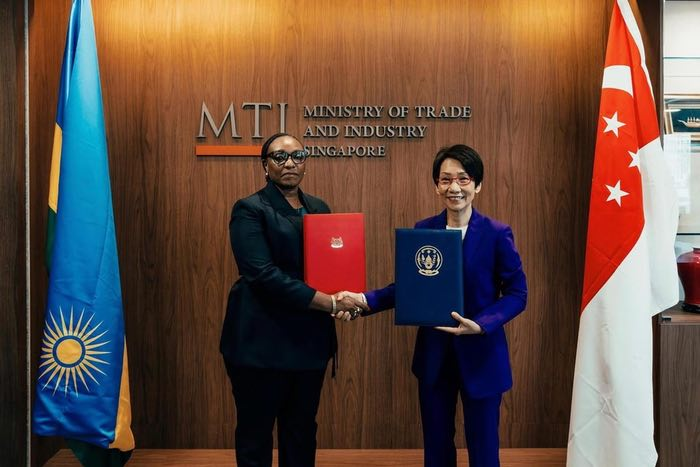
By John Mugisha
Rwanda on Tuesday became the sixth country to sign a carbon trading agreement with Singapore, bolstering international efforts to cut greenhouse gas emissions and accelerate sustainable development under the Paris Agreement.
The deal, signed in Singapore by Rwanda’s Minister of Environment Dr. Valentine Uwamariya and Singapore’s Minister for Sustainability and the Environment Grace Fu, allows Singapore to purchase high-quality carbon credits from emission-reduction projects based in Rwanda.
“This agreement builds on our strengthened cooperation in forward-looking areas such as the digital economy and fintech,” Fu said in a statement. “It also deepens our partnership in climate action.”
Uwamariya said the agreement reinforces Rwanda’s efforts to build a credible and transparent carbon market.
“Through this agreement, we aim to promote high-integrity carbon markets, achieve tangible emissions reductions, and support sustainable development for our communities,” she said.
The pact falls under Article 6 of the Paris Agreement, which enables countries to voluntarily collaborate in meeting their nationally determined contributions (NDCs) through carbon credit transfers.
Singapore, which has also signed Article 6 agreements with Ghana, Papua New Guinea, Bhutan, Peru and Chile, aims to offset up to 2.5 million tonnes of carbon emissions annually through 2030. The credits may be used by companies to offset up to 5% of their taxable emissions under Singapore’s national carbon tax system.
Carbon credits represent one metric tonne of avoided or removed carbon dioxide. To qualify under Singapore’s system, credits must originate from projects in countries with formal implementation agreements.
While Singapore is in talks with more than 15 other countries — including Malaysia, the Philippines and Sri Lanka — experts say African nations such as Ghana and Rwanda have taken the lead in building carbon market infrastructure and legal frameworks.
“Fortunately for some African nations like Ghana, the Swiss and Singapore helped cultivate the capacity-building and legislation to build Article 6 policies,” said Alvin Lim, CEO of Singapore-based Climate Bridge International. “The ASEAN countries are only now, over the last two years, going through that same process.”
Ghana has already earned more than $800 million by selling carbon credits to Switzerland and Sweden, according to figures released in November 2024.
Rwanda launched its Carbon Market Framework in December 2023 during the United Nations Climate Change Conference (COP28) in Dubai. On the same day, it signed cooperation agreements with Singapore and Kuwait to operationalize Article 6 trading.
The framework, developed by the Rwanda Environment Management Authority (REMA) with support from the United Nations Development Programme (UNDP), outlines a governance structure and technical procedures to ensure transparency, accountability and environmental integrity.
REMA Director General Juliet Kabera said the framework provides confidence to private investors and sets rigorous standards for credit verification.
“Every credit bought in Rwanda will be done in a way that is transparent, verified and meets the requirements of the international carbon market,” she said in a statement issued by the Ministry of Environment.
Rwanda’s updated climate plan commits to reducing greenhouse gas emissions by 38% by 2030, using a mix of domestic action and international support. The plan targets key sectors including agriculture, energy, waste, and industry, while aiming for climate adaptation across water, health, transport, forestry and mining.
To meet these goals, the government estimates it will need $11 billion — $5.7 billion for mitigation and $5.3 billion for adaptation measures. Of that amount, $4.1 billion is expected to be raised domestically, while the remaining $6.9 billion will rely on international financing, including carbon markets and cooperative approaches under Article 6.
Kabera said carbon trading offers Rwanda a “transformational opportunity” to align climate action with economic development.
